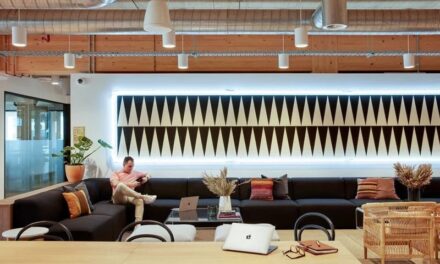While some of the world’s most notorious entrepreneurs founded their companies in garages, many successful startups actually began in coworking spaces. In fact, a surprising number of global companies got their start in shared office spaces and continue to reside there today.
This article will explore the benefits of coworking spaces for freelancers and startup founders, plus look at some historical examples of startups that began and thrived in coworking environments.
What are Coworking Spaces?
Coworking spaces are joint office spaces that can be used by many workers, freelancers, and startup founders simultaneously. Think of them as rentable shared office spaces.
Most coworking spaces include spacious office work accommodations, including tables, USB ports, high-speed Internet, and more. Many coworking spaces also offer refreshments, like coffee, snacks, and so forth.
Higher-end coworking offices provide additional benefits and perks, such as fitness classes, cafeterias, workshops, etc. They all have distinct brand identities, feels, and focuses.
Regardless, the point of each coworking space is to provide an environment where small groups of people or freelancers can work and focus without having to work from home or rent expensive office space. Most coworking spaces allow entry for monthly or yearly fees, usually several hundred dollars per month.

How Have Coworking Spaces Contributed to Startup Success?
Coworking spaces have contributed to startup successes in many different industries because they provide three major benefits for new companies that don’t want a fixed office or traditional lease.
Affordability
The vast majority of coworking spaces are – at least when you look at the flat rates needed to rent space or gain access to a building – much cheaper than buying or renting a traditional office environment. That’s doubly true in the earliest days of your startup’s lifespan, when your staff might include you and, at most, a handful of other employees or co-founders.
Since you don’t need a ton of office space when you are growing your business from the ground up, you can use a coworking space to get all the workspace you need – plus access to key materials, like printers and computers – for a fraction of the cost needed to rent a retail office building. That’s more money in your pocket and more you can put into your business.
Of course, many entrepreneurs attempt to save enough cash or build the startup funds necessary to create their enterprises through passive income streams. Running a blog, affiliate advertising, and creating courses are each examples of ways you can make passive income online. But no matter how much money you save, bills will eventually come due.
If you grow your startup at a coworking space, odds are you’ll save much more money on business operational expenses, which you can then funnel back into your enterprise to grow it that much more quickly.
Cost-Effective Scaling
Another big way in which coworking spaces are helping to launch successful startups is by enabling cost-effective scaling.
Eventually, any startup has to scale if it wants to thrive in its chosen market niche. However, scaling can be financially difficult and logistically complex. Founders might make a profit with their small businesses at the moment, for example, but may not know how to translate those profits into hiring more people. Or they may not make enough money to splurge on a big retail office or more warehouse space.
Through coworking spaces, startup entrepreneurs and founders can “scale” their businesses by hiring more employees. Then they can simply have their employees work from home or in coworking spaces.
By not having to purchase more office space or larger worker accommodations, startup founders can use that money for other elements of a business scaling plan.
Access to Talent
The third benefit that coworking spaces provide to startups is access to talent. When a new startup with rockstar employees works or hosts meetings at a coworking location, that organization displays its ideas and people front and center… right in front of many other remote workers and qualified freelancers.
For example, a startup founder might grow their marketing agency from a coworking space. Other digital marketers and freelancers will see the startup grow over time, possibly causing them to develop an interest in the company and potentially submit an application for open positions. It’s essentially free marketing for new, top-tier employees.
If you plan to leverage coworking spaces to attract talent, just remember not to hire too many employees immediately if your budget is limited, even if many of them seem interested in your up-and-coming enterprise. An alternative to hiring employees is to hire contractors on a freelance basis instead. Remember that you’re responsible for paying a 1099-NEC for every independent contractor you hire, so long as you pay them over $600 for the year, so factor this into your budget and accounting.

Examples of Startups Launched Thanks to Coworking Spaces
Over the years, many highly successful businesses have gotten their start in coworking spaces. Here are just a few examples of the enterprises that have seen success, partially due to where they began:
1. Spotify
The music streaming giant began in a coworking space based in Stockholm, Sweden. The founders of Spotify began their business journey here and used the benefits of coworking spaces to focus on developing the product rather than worrying about things like discovering affordable office space or paying for furniture. Spotify launched its international product in 2010.
2. Uber
The ridesharing company also began in a shared office coworking space. The founders of this company began in San Francisco, using a coworking location’s high-speed Internet connections and additional resources to grow their business rapidly. This, combined with the fact that Uber drivers can make a lot of money is what has largely contributed to the company’s incredible success. Today, Uber is valued at over $83 billion.
3. Instagram
The social media platform is another good example of a startup that successfully began at a coworking office. Instagram was founded in 2010, and its founders began working in a coworking space in San Francisco. The founders used the coworking space to focus on providing a top-tier platform, enabling them to bring in millions of dollars of investment cash over time.
4. ZipRecruiter
The recruitment platform, began at, you guessed it, a coworking space. It grew rapidly from a small business to a major platform connecting talent with large organizations worldwide, including Fortune 1000 companies. Over 25 million people are currently registered on this platform.
Conclusion
Many successful startup companies began in coworking spaces. Sharing office space is far from a liability – it could actually be what small, budding companies need to save money and build up enough entrepreneurial inertia to reach success.
If you’re considering launching a startup, using a coworking space can help you to achieve your goals in the most cost-effective way possible.









